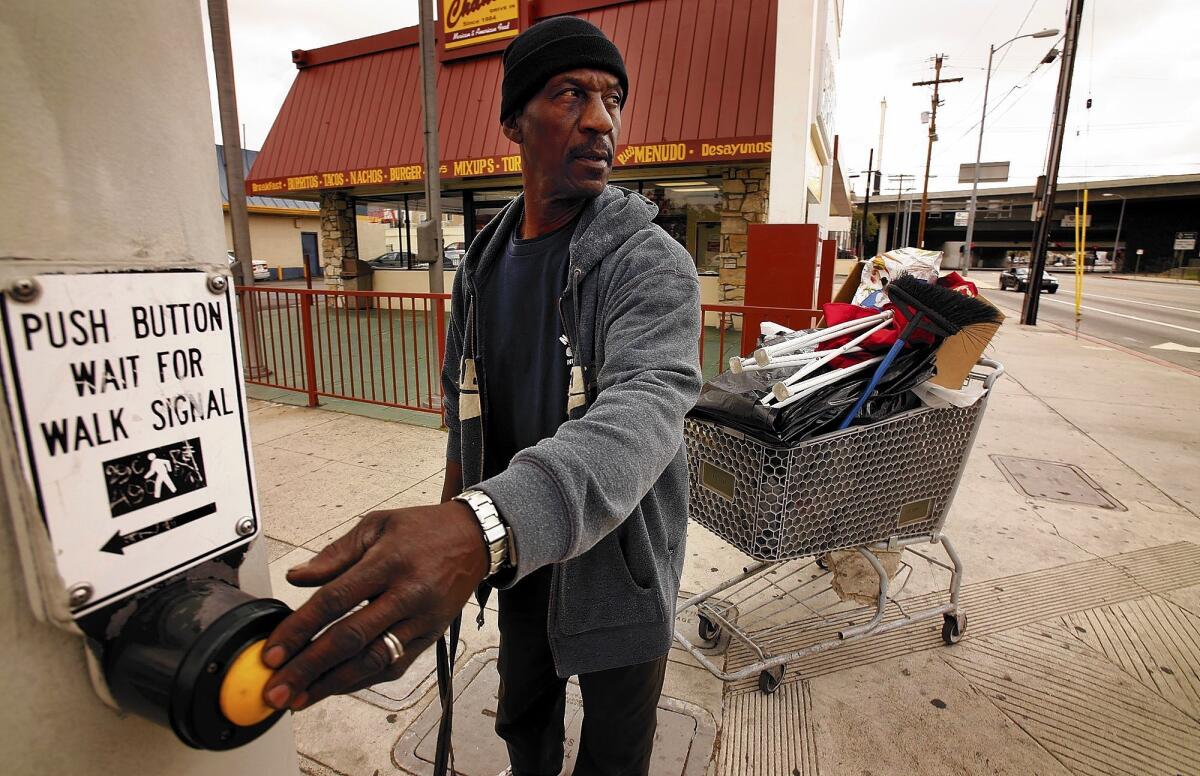Goodbye to my ‘Texas Cowboy’

- Share via
Most reporters I know have a story they’ve covered that’s stuck with them, long after the journalism was done.
Mine is about Eddie Dotson, a man who lived for years on the streets, under a freeway near USC — until I met him in 2009 and helped his family retrieve him.
I wrote a column then about Eddie and the elegant sidewalk dwelling he’d built from other people’s castoffs:
He didn’t have water or electricity, but he had matching candlesticks on his coffee table, a bowl of fruit on a kitchen counter and artwork mounted on tarpaulin walls. His golf clubs were propped against a bookcase, his clothes hung neatly in a closet made of cardboard.
I marveled at the way he’d walled himself off from ugly surroundings, creating comfort amid squalor.
I celebrated when his family in Texas got wind of my column and convinced him to return home to Austin.
And I’m mourning now because Eddie Dotson died last week, at 71, of pancreatic cancer.
The news was relayed to me by an aunt I’d met on a visit to Austin. “He really enjoyed these last years in Texas,” she told me gently — as if I deserve credit for that.
I may be the hero in his family’s version of their reunion story, but he’s the hero in mine.
I learned a lot from Eddie. I only wish I’d let him know that before he died.
::
I’ve spent this week trying to untangle all that Eddie meant to me.
Some is intensely personal. His courtly manner and genteel demeanor made me pine for my own father, who died in 1989 and had those same qualities. I felt smarter, kinder, more connected to my best self in Eddie’s company.
Our relationship challenged journalistic conventions. As a reporter, you want to fill in the blanks, to dig, to understand. His story always had loose ends, unfathomable components: Why’d he leave Austin without saying goodbye? How could he bear to stay out of touch so long with a family he clearly loved?
His son and daughter had been searching for him since 1990. He’d disappeared after his janitorial business failed, his marriage to their mother broke up and the kids headed off to college.
Every question I asked about that he answered politely, but without saying much. I made a choice that was uncomfortable for a reporter; I would simply stop asking and respect his privacy. I’d have to make peace with not knowing, just as his family had.
I came to admire his dignity and the resilience he displayed — his quiet confidence in a course that saner minds might find strange.
Every few months, street cleaning crews would tear down his shelter and cart off his belongings. I would go ballistic. But he would rebuild without complaint, patiently scouring the city and hauling things plucked from curbs and trash bins on his rickety bike.
He was creatively, compulsively feeding his need to nest, just as I do in my suburban home with flowers, photos and tchotchkes.
I was touched by the tenderness he showed to others’ rejects, whether it was the stray dog he rescued from a busy street or the torn sofa cushions he mended so his guests would have somewhere to sit.
I tried to treat Eddie to food and gifts, but he graciously resisted. I was obsessed with caretaking; he was dutifully self-sufficient.
It embarrassed me to realize how little he needed to be happy: his dog, a good book, a clean pillow, an uneventful evening. That forced me to examine my own distinctions between luxury and comfort. He was a minimalist; my life was cluttered with things.
He didn’t beg or panhandle, but strangers were drawn into his orbit. After my column, several readers shared stories about how his life had touched theirs — like USC law student Nataline Viray-Fung, whose weekly chats with the homeless man were a settling force.
“I was always so anxious,” she told me. “And he was always so calm.”
::
We stayed in touch when he went back to Austin. His calls would make my day. “It’s your Texas Cowboy,” he’d say, and we’d laugh. He called me his angel.
It didn’t seem to matter to his family and friends why Eddie had dropped off the map. They embraced him with joy and gratitude, not questions or resentment.
Even his children didn’t need answers. They always knew their father loved them; that was enough, they said.
He’d been a hands-on dad when they were young, always willing to listen, encourage and offer advice to them and all their friends. Looking back, they credit his lessons for their current success.
“All the stuff he preached to us growing up, about respecting yourself, loving your neighbor,” his son, Tre, said. “That’s instilled in me.”
Eddie was thrilled when his daughter Ericka flew to Los Angeles to see him after my column ran. She persuaded him to ride the train with her to visit family in Austin. I agreed to keep his dog until he came back.
Three months later, I flew to Texas to deliver the dog and check out his new life. Eddie was living in a condo, driving a Lexus and basking in the love of family and friends who were delighted that “Junior” was back.
He hadn’t changed, they said, from the humble young man who’d been voted “Most Ideal” by his high school’s senior class. “Good begets good,” his best friend told me. “God has his hands on Eddie.”
That’s the thought that comforts me now. Godspeed, my Texas Cowboy. From your California Angel.
More to Read
Sign up for Essential California
The most important California stories and recommendations in your inbox every morning.
You may occasionally receive promotional content from the Los Angeles Times.














